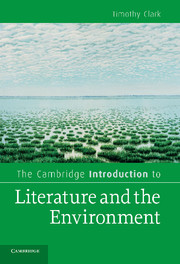Book contents
- Frontmatter
- Contents
- List of illustrations
- Preface
- Acknowledgements
- Introduction
- Romantic and anti-romantic
- The boundaries of the political
- Chapter 7 Thinking like a mountain?
- Chapter 8 Environmental justice and the move ‘beyond nature writing’
- Chapter 9 Two readings
- Chapter 10 Liberalism and green moralism
- Chapter 11 Ecofeminism
- Chapter 12 ‘Post-colonial’ ecojustice
- Chapter 13 Questions of scale
- Science and the struggle for intellectual authority
- The animal mirror
- Notes
- Further reading
- Index
- Cambridge Introductions to …
Chapter 13 - Questions of scale
The local, the national and the global
Published online by Cambridge University Press: 05 June 2012
- Frontmatter
- Contents
- List of illustrations
- Preface
- Acknowledgements
- Introduction
- Romantic and anti-romantic
- The boundaries of the political
- Chapter 7 Thinking like a mountain?
- Chapter 8 Environmental justice and the move ‘beyond nature writing’
- Chapter 9 Two readings
- Chapter 10 Liberalism and green moralism
- Chapter 11 Ecofeminism
- Chapter 12 ‘Post-colonial’ ecojustice
- Chapter 13 Questions of scale
- Science and the struggle for intellectual authority
- The animal mirror
- Notes
- Further reading
- Index
- Cambridge Introductions to …
Summary
There is one way in which environmental issues patently encompass and largely determine the politics and cultures of colonialism and post-colonialism. Over the past three centuries colonisation – and now global capitalism – has invariably expressed itself in the supplanting of local biota in favour of an imported portmanteau of profitable species: cattle, wheat, sheep, maize, sugar, coffee, palm oil, and so on. Thus it is that most of the world's wheat, a crop originally from the Middle East, now comes from other areas – Canada, the United States, Argentina, Australia – just as people of mainly European descent now dominate a large proportion of the earth's surface.
This huge shift in human populations, including slaves as well as domesticated animals and plants, has largely determined the modern world. It is still widely reflected in kinds of racial and cultural prejudice linked to modes of food production. In Australia and North America the obliteration or displacement of indigenous ways of life by pastoralism and the growing of cereal crops justified itself in assertions that such farming was ‘superior’ to hunting and gathering. As a result of such processes the Caribbean, for instance, with its plantations of sugar cane, coffee and so on has become ‘one of the most radically altered landscapes in the world’. ‘The forced transplantation of peoples, plants and animals to the primarily island species of the region created a complex layering, a hybridization of diverse cultural and environmental forms’, a condition that may soon become a global norm.
- Type
- Chapter
- Information
- The Cambridge Introduction to Literature and the Environment , pp. 130 - 140Publisher: Cambridge University PressPrint publication year: 2011

